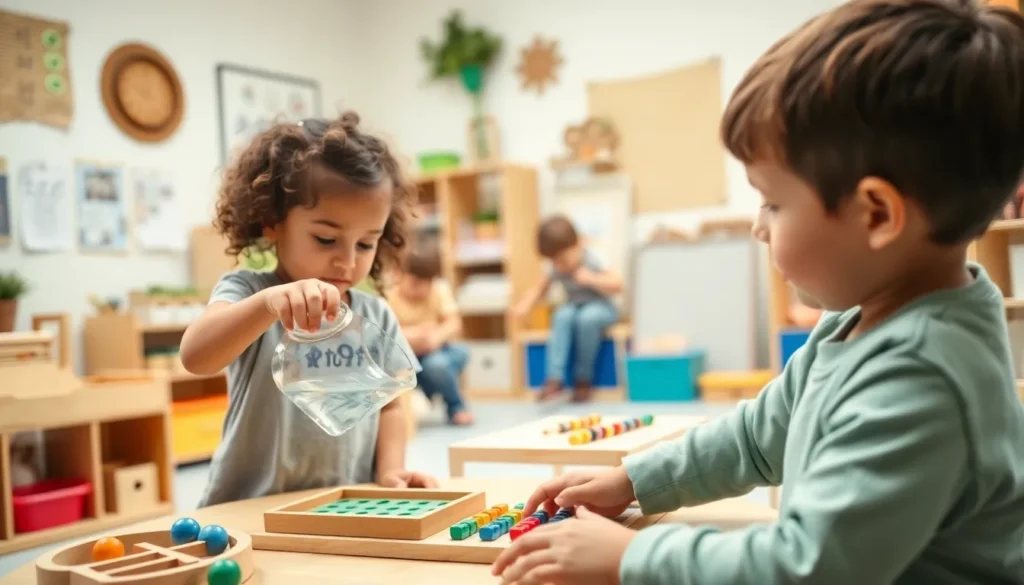Table of Contents
ToggleImagine a classroom where kids learn by doing, exploring, and having fun—sounds like a dream, right? Welcome to the world of Montessori learning activities, where education transforms into an adventure rather than a chore. These hands-on experiences not only ignite curiosity but also empower children to take charge of their own learning journey.
Overview of Montessori Learning Activities
Montessori learning activities emphasize hands-on engagement. These activities promote exploration and discovery, allowing children to learn at their own pace. Incorporating practical life skills, they include tasks such as pouring, sweeping, and buttoning, fostering independence.
Creative arts also play a crucial role in Montessori settings. Children express themselves through drawing, painting, and crafting, enhancing their fine motor skills and creativity. Additionally, sensory experiences are integral, with materials like sandpaper letters and textured objects supporting tactile learning.
Mathematics and language activities use specially designed materials. Counting beads and number rods simplify abstract concepts, while phonetic objects assist in language development. Such structured materials guide children, making complex topics accessible.
Social interaction forms another vital aspect. Group activities encourage cooperation and communication. Role-playing scenarios build social skills, allowing children to practice empathy and teamwork.
Montessori learning activities adapt to diverse learning styles. Visual learners engage with charts and diagrams, while auditory learners benefit from storytelling sessions. This flexibility caters to individual needs, promoting effective learning experiences.
Curriculum integration occurs through themed projects. Topics like nature, history, and cultures provide a holistic view. Children investigate these subjects through research, discussions, and practical experiments.
Montessori learning activities encompass various domains. By focusing on child-led exploration, these activities nurture a lifelong love for learning. Engaging with these methods, children develop critical skills that apply to real-world situations.
Benefits of Montessori Learning Activities

Montessori learning activities offer numerous advantages for children’s development. They create opportunities that foster growth in various areas.
Fostering Independence
Independence becomes a core aspect of the Montessori approach. Activities such as pouring and buttoning empower children to perform tasks independently. They gain confidence as they master skills like self-care and organization. Self-directed learning encourages children to make choices, enhancing their decision-making abilities. In a supportive environment, children learn to take responsibility for their actions. Through these experiences, children develop a sense of autonomy that extends beyond the classroom. Consequently, they become more equipped to navigate challenges in everyday life.
Enhancing Cognitive Skills
Cognitive skills flourish within a Montessori framework. Hands-on activities engage children in meaningful learning experiences. Manipulative materials, such as counting beads, simplify abstract concepts in mathematics. Sensory play enhances problem-solving and critical thinking skills, allowing for exploration. Activities targeted at language development promote vocabulary acquisition and comprehension. Collaborative tasks encourage children to communicate effectively and develop social reasoning. The focus on exploration and discovery nurtures creativity and innovation. These cognitive advancements prepare children for academic success and lifelong learning.
Key Principles of Montessori Education
Montessori education centers on key principles aimed at fostering a child’s natural development and growth. Emphasizing the individuality of each learner, these principles provide a foundation for effective learning experiences.
Child-Centered Learning
Child-centered learning places the student at the heart of the educational process. Choices made by the child guide learning pathways, allowing exploration and discovery at their own pace. Flexibility in activities cultivates engagement and ownership of learning experiences. Teachers serve as facilitators, stepping back to observe rather than directing, which promotes independence. This approach nurtures meaningful connections between the child and the material, enriching their educational journey. Tailoring lessons to the interests and needs of each child enhances motivation and investment in their learning.
Hands-On Activities
Hands-on activities form the backbone of Montessori education, transforming abstract concepts into tangible experiences. Children interact with specially designed materials, making learning more effective and enjoyable. Engaging with items like counting beads or sensory bins deepens understanding and retention of new information. Such experiences build confidence and competence in various skills, from practical life tasks to complex academic topics. Through experimentation and exploration, children gain insights that reinforce critical thinking and problem-solving abilities. This active participation fosters a love of learning while developing comprehensive skill sets applicable in real life.
Popular Montessori Learning Activities
Montessori learning activities encompass a range of engaging tasks that promote autonomy and skill development. Each activity focuses on a specific area of growth, ensuring children gain valuable experience through hands-on exploration.
Practical Life Activities
Practical life activities involve everyday tasks that cultivate independence. Tasks like pouring water, buttoning clothes, and sweeping help children develop fine motor skills while fostering confidence. Engaging in cooking or plant care reinforces responsibility and nurtures a sense of accomplishment. These activities empower children to take ownership of their surroundings and encourage decision-making in a supportive environment.
Sensorial Activities
Sensorial activities aim to refine children’s senses through tactile exploration. Materials designed for these tasks, such as texture tiles and sound boxes, enhance sensory perception. Exploring scents with spice jars or identifying colors through color tablets builds awareness of the world. Participating in these activities not only heightens sensory experiences but also aids in categorization and discrimination, crucial skills for future learning.
Language and Literacy Activities
Language and literacy activities focus on developing communication skills and vocabulary. Children interact with materials like sandpaper letters and movable alphabets, simplifying the connection between sounds and letters. Storytelling sessions encourage expressive language development and comprehension. Engaging in these activities ensures that children gain a strong foundation for reading and writing, preparing them for academic success.
Montessori learning activities offer children a unique opportunity to thrive in an engaging and supportive environment. By nurturing independence and promoting hands-on exploration, these activities lay the groundwork for lifelong learning. The focus on practical life skills and creative expression not only enhances cognitive development but also fosters essential social skills.
As children interact with thoughtfully designed materials, they build confidence and critical thinking abilities. This child-centered approach empowers them to take charge of their educational journey, transforming learning into an enjoyable adventure. Embracing Montessori principles can lead to profound benefits that extend beyond the classroom, preparing children for future challenges with a strong foundation in both knowledge and skills.


